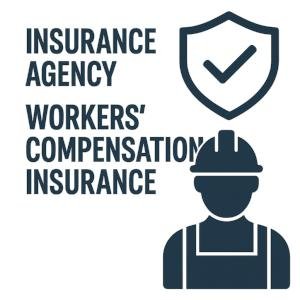
Georgia Workers’ Comp Requirements—Employment Agencies
August 4, 2025
Top 10 Questions About Workers Comp Cost Drivers
August 4, 2025In today’s dynamic labor market, personnel agencies play a critical role in connecting businesses with qualified talent across diverse industries. However, the complexity of managing workforce risks, especially those related to workplace injuries, underscores the importance of comprehensive workers’ compensation insurance. This article delves into the essential aspects of workers’ comp insurance tailored specifically for personnel agencies, outlining its meaning, regulatory requirements, and practical considerations to ensure both legal compliance and financial protection in an increasingly competitive staffing environment.
Table of Contents
- Understanding Workers’ Compensation Coverage for personnel agencies
- Key Legal considerations and Compliance Requirements
- strategies for Managing Claims and Minimizing Risks
- Best Practices for Selecting and Working with Insurance Providers
- Q&A
- to sum up
Understanding Workers’ Compensation Coverage for Personnel Agencies
Personnel agencies operate in a unique legal and operational landscape when it comes to workers’ compensation coverage.Unlike traditional employers, these agencies frequently enough have dual responsibilities-both as the employer of record and as a service provider to client companies. This dual role means that understanding who carries the responsibility for coverage in any given scenario is critical. Typically, workers’ compensation insurance must cover all employees, including temporary or contract workers dispatched to client sites, ensuring protection against job-related injuries or illnesses. Without clear policies, personnel agencies risk liability gaps that could lead to costly legal disputes or penalties.
Key factors to consider when assessing workers’ compensation requirements include:
- Classification of Workers: Properly identifying whether workers are employees or independent contractors influences coverage eligibility.
- Jurisdictional Regulations: State-specific laws can vary significantly on compensation requirements for temporary staff.
- Contract Agreements: Clearly outlined terms between the agency and client companies can help allocate coverage responsibilities.
- Risk Assessment: Evaluating the workplace hazards faced by personnel to determine appropriate premium levels and safety protocols.
| Coverage Aspect | Personnel Agencies | Client Companies |
|---|---|---|
| Policy Holder | Typically Agency | Varies by contract |
| Risk Responsibility | On-site injuries of dispatched workers | Work environment safety |
| Claims Management | Manages employee claim processing | Support in examination |
Key Legal Considerations and Compliance Requirements
Personnel agencies must navigate a complex web of legal obligations to ensure their workers’ compensation policies are compliant and protect their diverse workforce. It is indeed crucial to understand that workers’ comp requirements can vary significantly by state, frequently enough dictating mandatory coverage limits, claim procedures, and insurer qualifications. Failure to comply not only exposes agencies to hefty fines and legal penalties but can also jeopardize their eligibility to operate in certain jurisdictions.Agencies should regularly review state-specific legislation, maintain comprehensive documentation, and coordinate closely with insurance carriers to adapt to evolving legal landscapes.
Moreover, agencies need to pay special attention to the classification of their workforce, as misclassifying temporary or contract workers can lead to noncompliance issues. Key compliance factors include:
- Correct worker classification: Distinguishing between employees, contractors, and temporary staff to determine coverage eligibility.
- Accurate payroll reporting: Ensuring payroll data is reported correctly to calculate premium rates appropriately.
- Timely claims management: Adhering strictly to state deadlines for reporting work-related injuries and providing documentation.
- Regular policy audits: Conducting internal or third-party audits to confirm ongoing compliance and minimize risk exposure.
Strategies for Managing Claims and Minimizing Risks
Implementing proactive measures is fundamental to controlling costs associated with workers’ compensation claims. Personnel agencies should prioritize comprehensive safety training tailored to the unique environments in which their temporary staff operate. This not only reduces the likelihood of accidents but also demonstrates a commitment to employee well-being, which can positively affect claim outcomes. Additionally,maintaining clear and prompt interaction channels between the agency,the client,and the injured worker ensures that claims are reported swiftly and managed efficiently,minimizing delays and reducing potential liability exposure.
Equally vital is the systematic evaluation of risk factors through regular audits and data analysis. By leveraging claims history and worksite assessments, agencies can identify patterns and implement targeted interventions. below is a simple comparison of key practices and their impact on risk mitigation:
| Practice | Impact on Claims | Implementation Ease |
|---|---|---|
| Safety Training programs | Reduces incidents by 30% | Moderate |
| early Claim Reporting | Speeds resolution by 40% | Easy |
| Regular Risk Assessments | Identifies hazards proactively | Challenging |
- Implement Return-to-Work Programs: Facilitates faster recovery and reduces indemnity costs.
- Engage Experienced Claims Adjusters: Ensures proper investigation and fair settlements.
- Maintain detailed Documentation: Supports dispute resolution and accurate reporting.
Best Practices for Selecting and Working with Insurance Providers
When choosing an insurance provider for workers’ comp coverage, it’s essential to conduct thorough research to ensure their services align with the unique needs of personnel agencies. Start by evaluating the provider’s financial stability, claims handling reputation, and expertise in servicing staffing businesses. It’s wise to lean towards insurers who demonstrate a clear understanding of the payroll complexities and varied employee classifications inherent in your industry. Additionally, request detailed quotes and compare not just premium costs but also coverage limits, exclusions, and additional risk management resources offered.
Establishing a strong working relationship with your insurance provider can lead to more proactive risk mitigation and smoother claims processing.Consider these key steps to foster collaboration:
- Open communication: regularly update the insurer with changes in your agency’s operations or workforce.
- Utilize technology: Leverage online portals for timely claims reporting and policy management.
- Risk control support: Engage the insurer’s consultation services to identify workplace hazards.
| Criteria | What to Check | Why it Matters |
|---|---|---|
| Financial Stability | Credit ratings, industry reviews | Ensures reliable claim payments |
| Claims Handling | Speed and clarity | Minimizes operational disruptions |
| Industry Expertise | experience with staffing firms | Tailored solutions and accurate risk assessment |
Q&A
Q&A: Workers’ Comp Insurance for Personnel Agencies Explained
Q1: What is workers’ compensation insurance, and why is it important for personnel agencies?
A1: Workers’ compensation insurance is a form of coverage that provides medical benefits and wage replacement to employees who suffer work-related injuries or illnesses. For personnel agencies, which typically place temporary or contract workers at various client sites, this insurance is crucial as it protects both the agency and its employees from financial losses arising from workplace accidents.It also ensures compliance with state laws and helps maintain the agency’s reputation.
Q2: How does workers’ comp insurance differ for personnel agencies compared to traditional employers?
A2: Personnel agencies face unique challenges in securing workers’ comp coverage because their employees often work at multiple client locations with varying risk profiles. Unlike traditional employers who operate from a single site, personnel agencies must account for the diverse work environments their staff enter. This complexity usually requires tailored policies that can cover temporary workers across different assignments, sometimes involving separate endorsements or specialized carriers.
Q3: Who is responsible for providing workers’ comp insurance-the personnel agency or the client company?
A3: typically, the personnel agency is responsible for providing workers’ comp insurance for the employees it directly hires. Though, contractual agreements between the agency and client companies may specify responsibilities differently. It is vital for both parties to clearly outline insurance obligations to avoid coverage gaps or disputes in the event of a claim.
Q4: What factors influence the cost of workers’ comp insurance for personnel agencies?
A4: Several variables affect premium rates, including the types of jobs assigned, the risk levels associated with client workplaces, the total payroll, and the claims history of the agency. Additionally,jurisdictions’ differing workers’ comp regulations and classification codes for occupations play a role in determining the final cost.
Q5: Are temporary or contract workers covered under workers’ comp insurance?
A5: Yes, temporary and contract workers employed by personnel agencies are generally covered under the agency’s workers’ comp insurance. This coverage is essential because these workers often face potential hazards at client job sites. Ensuring they are insured protects both the workers and the agency from liability.
Q6: What are the potential risks of not carrying adequate workers’ compensation insurance for a personnel agency?
A6: If a personnel agency fails to maintain sufficient workers’ comp coverage, it risks severe legal and financial consequences. This can include penalties or fines from regulatory bodies, exposure to lawsuits, direct liability for medical and wage expenses, and damage to the agency’s professional credibility.
Q7: How can personnel agencies ensure they remain compliant with workers’ compensation regulations?
A7: To stay compliant, agencies should regularly review applicable state and federal laws, maintain up-to-date policies that cover all employees, and work with experienced insurance providers familiar with the staffing industry. It is also advisable to clearly define the scope of coverage in contracts with client companies and conduct periodic audits to verify proper implementation.
Q8: What steps should personnel agencies take after an employee files a workers’ comp claim?
A8: After receiving a claim, the agency should promptly notify its insurance carrier, cooperate with any investigations, and ensure that the injured worker receives appropriate medical care. Maintaining thorough documentation and communicating transparently with all parties involved helps facilitate a smooth claims process and minimizes disruptions.
Q9: Can personnel agencies bundle workers’ comp insurance with other types of coverage?
A9: Yes, many agencies opt to bundle workers’ compensation with other insurance policies such as general liability, professional liability, and commercial auto coverage. Bundling can often lead to cost savings, simplified policy management, and comprehensive protection tailored to the unique needs of staffing businesses.Q10: Where can personnel agencies find specialized workers’ comp insurance providers?
A10: Agencies can seek out insurance brokers or carriers that specialize in the staffing and personnel industry. These providers understand the complexities involved and can offer customized solutions. Industry associations and networking groups may also provide recommendations for reputable insurers with expertise in this niche market.
In Conclusion
understanding workers’ compensation insurance is essential for personnel agencies striving to manage risk effectively and maintain compliance with regulatory requirements.By securing appropriate coverage, agencies not only protect their workforce but also safeguard their operational stability and reputation. As the staffing industry continues to evolve, staying informed about policy nuances and industry best practices will ensure personnel agencies are well-equipped to address the unique challenges associated with workers’ comp insurance.Employers and agency leaders are encouraged to consult with insurance professionals to tailor coverage strategies that align with their specific business needs and workforce dynamics.
“This content was generated with the assistance of artificial intelligence. While we strive for accuracy, AI-generated content may not always reflect the most current information or professional advice. Users are encouraged to independently verify critical information and, where appropriate, consult with qualified professionals, lawyers, state statutes and regulations & NCCI rules & manuals before making decisions based on this content.







